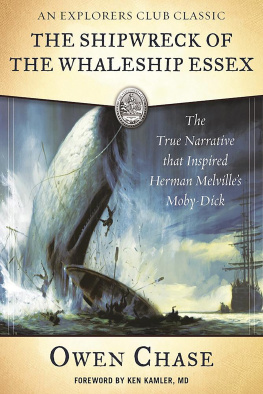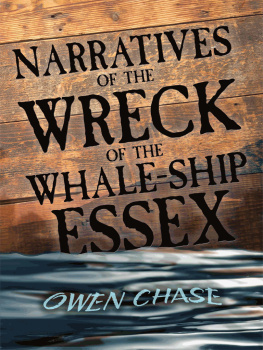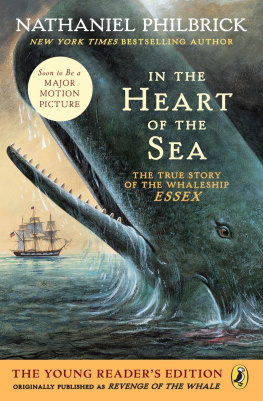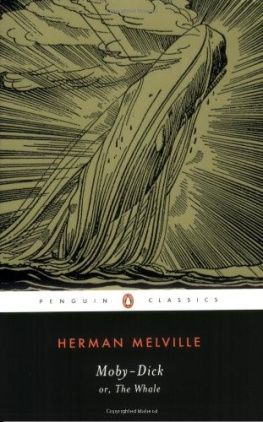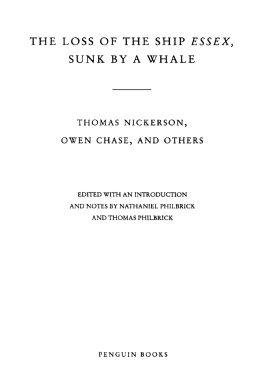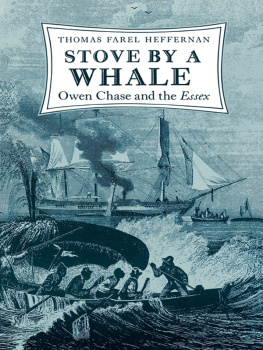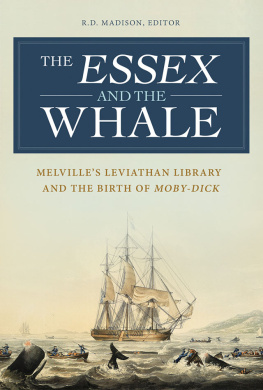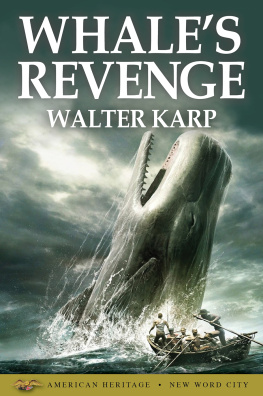
First Skyhorse Publishing edition copyright 2017
Foreword copyright 2017 Kenneth Kamler
All rights reserved. No part of this book may be reproduced in any manner without the express written consent of the publisher, except in the case of brief excerpts in critical reviews or articles. All inquiries should be addressed to Skyhorse Publishing, 307 West 36th Street, 11th Floor, New York, NY 10018.
Skyhorse Publishing books may be purchased in bulk at special discounts for sales promotion, corporate gifts, fund-raising, or educational purposes. Special editions can also be created to specifications. For details, contact the Special Sales Department, Skyhorse Publishing, 307 West 36th Street, 11th Floor, New York, NY 10018 or .
Skyhorse and Skyhorse Publishing are registered trademarks of Skyhorse Publishing, Inc., a Delaware corporation.
Originally published in 1821 by W. B. Gilley as Narrative of the Most Extraordinary and Distressing Shipwreck of the Whaleship Essex, of Nantucket; which was attacked and finally destroyed by a large spermaceti-whale, in the Pacific Ocean; with an account of unparalleled sufferings of the captain and crew during a space of ninety-three days at sea, in open boat; in the years 1819 & 1820.
Visit our website at www.skyhorsepublishing.com.
10 9 8 7 6 5 4 3 2 1
Library of Congress Cataloging-in-Publication Data is available on file.
Cover design by Tom Lau
Cover photo credit: Moby Dick, artist and date unknown.
Print ISBN: 978-1-5107-1578-3
Ebook ISBN: 978-1-5107-1579-0
Printed in the United States of America.
CONTENTS
FOREWORD TO THE 2017 EDITION
THE ocean is the largest wilderness on the surface of the earth, and the only one that moves. Currents, tides, and winds ensure that a lifeboat adrift will eventually wash ashore. This means that the sailors inside must endure the stresses of the sea long enough that when the lifeboat reaches land or another boat, there is still life in it.
A ship is a tiny, fragile construction moving through a vast, powerful, alien ecosystem. A sailors protection depends on his ability to preserve that artificial environment. Its ironic that the sea has become so foreign and terrifying to humans. It is home to 90 percent of life on earth, and it was from the sea that all life arose. That was a long time ago, however. The ocean contains food in abundance, but man without hunting equipment is a pathetic predator. And for the 10 percent of life that that doesnt live in the sea and cant drink saltwater, its a tormenting desert. A desert heated by a sun that, without shade, becomes a daily adversary.
So what happens when sailors are struck by overwhelming calamity and their remote outpost of civilization is suddenly crushed, thrusting them backward into a primitive state? Completely isolated from the rest of humanity, the rules that govern society will slowly, or not so slowly, erode. When subjected to life-threatening fear and deprivation, who among us would be able to maintain moral command over our primitive urges?
None of us knows for sure how we would respond, but we do know how the men of the Whaleship Essex reacted. First Mate Owen Chase has left us an eloquently written narrative of an epic survival voyage, evoking all its torment, tribulation, tragedy, and triumph.
Confusion and fear were the first reactions to the shipwreck, but these were seasoned sailors who, at first, responded well. They surmounted the confusion and channeled the fear into purposeful action. The crew of twenty suddenly found themselves in three open lifeboats, watching in horror as their stable, relatively comfortable whaling ship disappeared, leaving nothing but a stark, empty ocean in every direction. They were lucky enough to make it into lifeboats, and now had the chance to die of thirst, hunger, exposure, or isolation.
Humans may have left the sea, but they took the water with them. Two-thirds of a human body is water. At least a quart a day is lost through daily maintenance: breathing, sweating, and urinating; more when youre hot, scared, and working hard. With an inadequate re-supply, the body taps its own tissues, squeezing them like sponges until the skin turns to leather and the internal organs shrivel.
Drinking sea water makes the problem worse since the excessive salt forces the body to wring itself out even more to dilute the salt. Without a lot more water intake, the salt builds up and corrodes the bodys filtering systemthe kidneys shut down.
When food reserves run low, humans get the hunger signal to refuel. The solution is eating, except when theres nothing to eat. Then the body will start to devour its own protein, the building blocks critical to every one of our tissues and organs. Its like burning your house down to keep warm. The body literally begins to eat itself alive.
A body can last weeks without food, but only days without water. How long the mind can endure privation, isolation, and the looming fear of death is less certain. Of the seventeen men in the lifeboat, five survived, twelve did not. Yet rations were allotted equally and each of them was exposed to the same sea and sun. They were, in every way, in the same boat.
Pitting the human body against the sea would seem to be a pitiful mismatch, but five humans nevertheless prevailed. There were four factors in play that added up to their survival. The first is knowledgea mastery of sailing skills and an understanding of the sea that they shared. The second is conditioningthe crew was used to dealing with the rigors and hardships of ocean voyages. The third is luckevery survivor needs some. As a unit, they were all under the same providence.
Those three ingredients were equally distributed among the crew. What made the life-or-death difference was the fourth factorthe will to survive. It was of varying strength in each man, and just strong enough in the five who survived. The winning strategy for survivors seems to be maintaining a narrow focus on the demands of the environment while at the same time believing in a purpose that transcends their own lives. Owen Chase commanded the boat and believed it was his duty to save his crew. That was his winning formula and it must have been similar mindsets that saved the others.
When the battle against the sea ends in defeat, the story, no matter how heroic, will never be told. Owen Chases saga was nearly one of those. He won the battle, however, and has left us with an account of one of the greatest survival stories of all time.
Ken Kamler, MD,
author of Doctor on Everest and Surviving the Extremes
New York, NY
2017
ACKNOWLEDGMENTS TO THE 2017 EDITION
The Explorers Club is proud to publish our edition of Owen Chases The Wreck of the Whaleship Essex in collaboration with Jay Cassell, Editorial Director at Skyhorse Publishing. While not featuring a traditional explorers expedition, the struggle and the sheer endurance of those involved rank this account as one of the greatest survival stories ever told.
A special thanks goes to Explorers Club President Ted Janulis, for his enthusiasm and support. Additional thanks go to veteran explorer, Dr. Ken Kamler, for writing a new introduction; Executive Director, Will Roseman; Curator of Collections, Lacey Flint; George Gowen; and Veronica Alvarado.
Jay Cassell understands and honors The Explorers Clubs commitment to keep in print books representing excellence and challenge in exploration.
Lindley Kirksey Young
The Explorers Club
2017
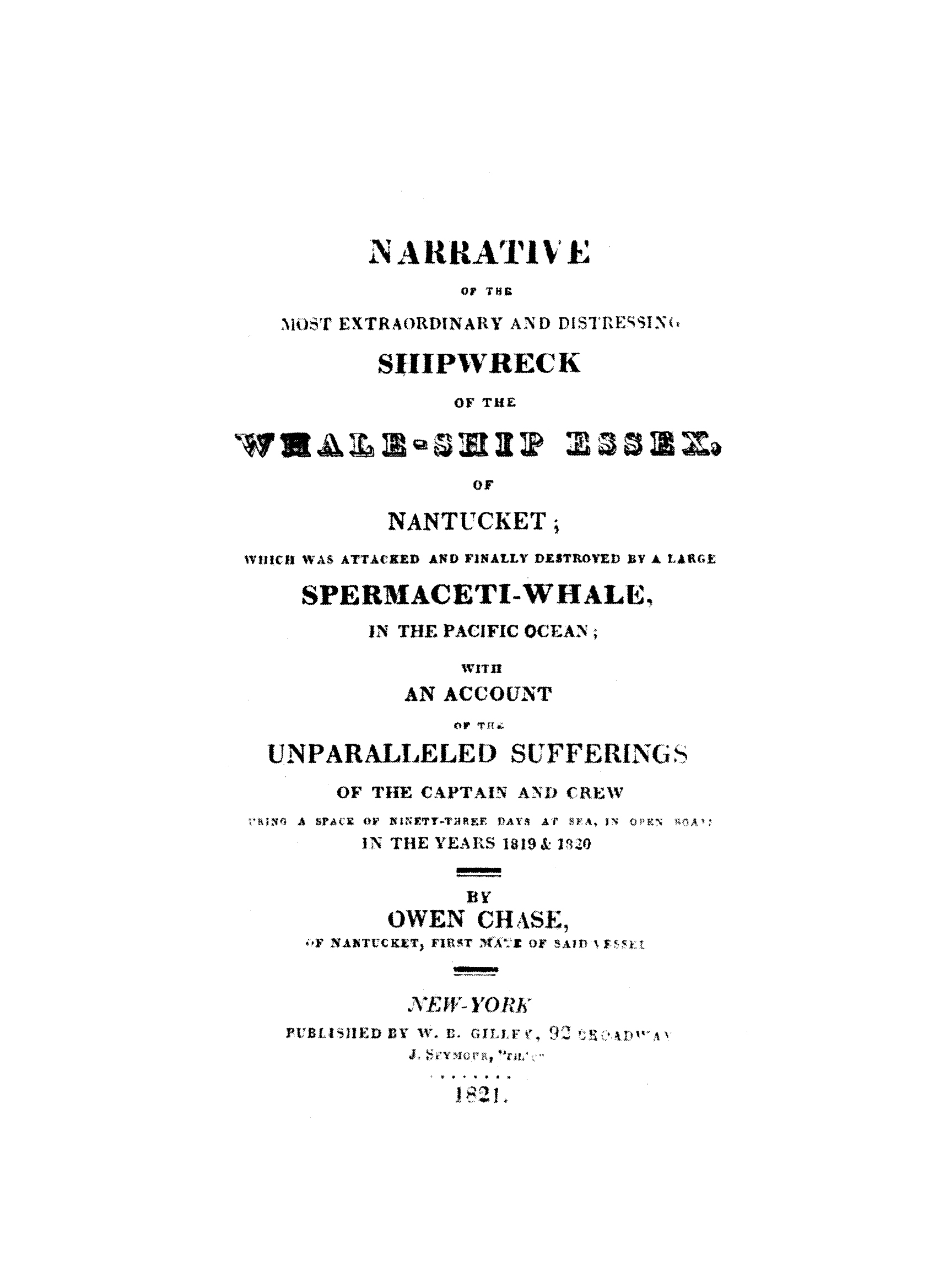
Next page
